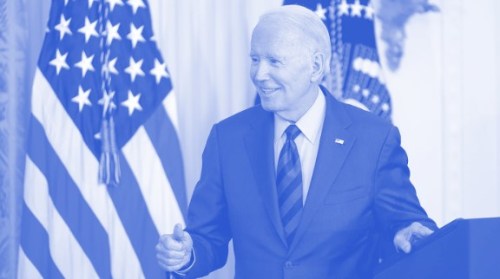Trump skips past primaries to general election
The Iowa caucuses are still more than four months away, but former President Trump already appears to have one eye toward a general election rematch with President Biden.
Trump’s words and actions are that of a candidate less concerned with his primary rivals, who trail him by a wide margin in nearly every state and national poll, and more focused on attacking Biden and winning over voters in key swing states.
Ford O’Connell, a Florida-based Republican strategist, said Trump has “the freedom to do what he thinks is best” with his campaign thanks to his significant lead in primary polls, and national polls that show him in a close hypothetical rematch with Biden.
“Trump is running the race as if this is going to be himself and Joe Biden in November of 2024,” O’Connell said. “And anyone who’s being honest will tell you that’s the right way to go, barring a seismic moment or shift or anything else.”
The former president’s speeches are typically filled with attacks on Biden’s immigration and economic policies and allegations of corruption against the president and his family. On social media, Trump frequently responds to news of the day about Biden, while occasionally attacking Florida Gov. Ron DeSantis (R) and other GOP rivals as well.
Trump is not attending next week’s Republican presidential primary debate in California after already skipping the first one.
Instead, he will head to Michigan to deliver remarks in front of union workers, seeking to capitalize politically in a pivotal swing state amid a United Auto Workers (UAW) strike.
Trump won Michigan in 2016 but lost it in 2020, and the state is one of a handful the former president would likely need to flip to win back the White House in 2024.
Trump has hammered Biden over his push for expanded incentives for electric vehicles, one factor at issue for striking workers. And while UAW leadership has been sharply critical of Trump, the former president’s planned appearance in Detroit reflects a focus on peeling away the kinds of voters he will need to weaken Biden’s coalition, while his Republican rivals fight it out on the debate stage hundreds of miles away.
The former president’s recent rhetorical maneuvering on abortion also underscores how he’s already trying to play to a general election audience more so than a Republican primary crowd.
Trump has repeatedly avoided saying whether he would sign a national abortion ban, though he has also taken credit for bringing about the end of Roe v. Wade through his appointment of three conservative Supreme Court justices and claimed it returned the issue to the states.
In a “Meet the Press” interview, Trump called Florida’s ban on abortion after six weeks of pregnancy a “terrible thing.”
Those comments have frustrated anti-abortion rights groups and social conservatives who have pushed for some type of national standard restricting abortion, and it triggered criticism from GOP governors in Georgia and Iowa who have signed similar bills to the one in Florida.
In a series of Truth Social posts Tuesday, Trump reiterated his belief that there should be exceptions to abortion bans in cases of rape, incest and when the life of the mother is at risk, suggesting it would be difficult to win elections with a more restrictive stance.
“Without the exceptions, it is very difficult to win Elections, we would probably lose the Majorities in 2024, and perhaps the Presidency itself, but you must follow your HEART!” Trump wrote. “In order to win in 2024, Republicans must learn how to talk about Abortion. This issue cost us unnecessarily, but dearly, in the Midterms.”
One Republican strategist argued that Trump’s approach to abortion shows he realizes Democrats are likely to attack him repeatedly on the issue. The end of Roe led to a surge in Democratic turnout in subsequent special elections and the midterms, and many Democrats are expecting the same in 2024.
Trump is not entirely blowing off the primary process, to be sure.
His campaign is aggressively looking to build support on the ground in Iowa and other early primary states. The former president is making multiple trips to the Hawkeye State this month, recognizing that a convincing victory in the caucuses there next January would effectively squash any momentum for a challenger heading into New Hampshire and South Carolina.
“I think it’s safe to say if Trump wins Iowa, this race is over,” the GOP strategist said.
Others believe Trump has been able to essentially look ahead to a general election campaign because his rivals in the Republican primary have not put enough pressure on him politically.
A FiveThirtyEight average of polls shows Trump polling nationally at 55 percent in the GOP primary, with DeSantis in second at 14 percent and the rest of the field in single digits. State-level polls have not been much better for Trump rivals.
Even an Emerson College poll this month that showed Trump’s support in Iowa declining from May found him leading DeSantis by more than 30 percentage points.
Doug Heye, a former spokesperson for the Republican National Committee (RNC), argued those running against Trump have failed to attack him head on or make the case for why they should be the nominee over him.
While former New Jersey Gov. Chris Christie (R) has attacked Trump directly, most other GOP primary candidates have instead offered broader arguments about electability and the need for generational change. And most candidates’ policy platforms echo Trump’s agenda from his first term in office.
“There has been no primary. We’ve had people go to Iowa, New Hampshire and all of that, but when your opponent is indicted four times and the response of most of his opponents is not to just not criticize, but to reinforce his own messaging and back him up, there’s no primary,” Heye said.
“If Trump wins Iowa, wins New Hampshire, how does he lose South Carolina?” Heye added. “It will be because everybody who threw their hat in the ring never actually ran a campaign against the front-runner. I can’t recall any race where we’ve seen that before.”
Copyright 2023 Nexstar Media Inc. All rights reserved. This material may not be published, broadcast, rewritten, or redistributed.





